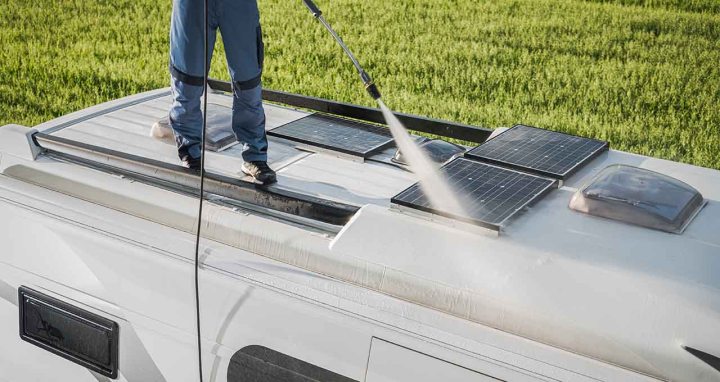
Introduction: Maintaining solar panels is crucial for ensuring optimal performance and maximizing energy production. Among the various maintenance methods available, pressure washing is often considered for cleaning solar panels. In this article, we will explore the pros and cons of pressure washing solar panels to help you make an informed decision about whether it’s the right approach for your solar panel maintenance needs.
The Case for Pressure Washing:
- Enhanced Efficiency: Over time, solar panels accumulate dust, dirt, bird droppings, and other debris, which can obstruct sunlight and reduce their efficiency. Pressure washing effectively removes these layers of grime, allowing the panels to absorb maximum sunlight and operate at their full potential.
- Increased Energy Output: By removing dirt and debris, pressure washing can lead to increased energy production. Clean solar panels can generate more electricity, maximizing the return on investment and contributing to a greener energy supply.
- Cost Savings: Maintaining clean solar panels through pressure washing can result in long-term cost savings. Dirty panels experience decreased efficiency, leading to reduced energy production and potential financial losses. Pressure washing ensures panels operate at their peak performance, enhancing energy savings and improving the return on investment.
The Case against Pressure Washing:
- Potential Damage: Pressure washing, if done improperly, can damage solar panels. The high-pressure water stream may scratch or crack the glass surface, affecting the panel’s functionality. It is essential to use the correct techniques and equipment specifically designed for cleaning solar panels to minimize the risk of damage.
- Warranty Voidance: Many solar panel manufacturers have specific guidelines regarding maintenance, including cleaning methods. Some warranties may be voided if panels are pressure washed, as it is considered a non-recommended cleaning method. Always consult the manufacturer’s guidelines and warranty terms before deciding to pressure wash your panels.
- Safety Concerns: Pressure washing involves working at heights, which can be hazardous without proper safety precautions. Handling high-pressure equipment without the necessary training and safety measures can lead to accidents and injuries. If you are not experienced in pressure washing or working at heights, it is advisable to seek professional assistance.
- Alternative Cleaning Methods: There are alternative cleaning methods available that are less risky and equally effective in maintaining solar panel cleanliness. Soft brush cleaning with a mild detergent or using a low-pressure hose can be effective in removing debris without the potential damage associated with pressure washing.
Pressure washing solar panels can be a double-edged sword. While it offers benefits such as enhanced efficiency and increased energy output, there are potential risks and considerations to keep in mind. The decision to pressure wash should be based on factors such as manufacturer guidelines, warranty terms, personal experience, and comfort level with the equipment. Ultimately, the goal is to ensure optimal performance and longevity for your solar panels while maintaining safety and avoiding potential damage. Consider consulting professionals or exploring alternative cleaning methods to find the best approach that suits your specific circumstances.
